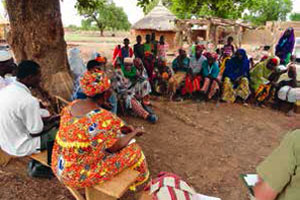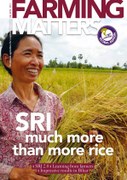Last year, West Africa faced a devastating food crisis, triggered by insufficient and erratic rains. The underlying causes include a systematic depletion of the soils, worsened by climate change. Many families and communities have taken their fate into their own hands.

In Ghana, the Center for Indigenous Knowledge and Organizational Development has supported dozens of women’s groups from 24 communities in Northern Ghana and eight villages in the southern part of the country. These women have formed the Rural Women Farmers’ Association of Ghana, and are now working to spread agroecological farming practices to improve production and food security.
In Mali, community-based organisations and networks are scaling up the natural regeneration of trees in order to re-green the Sahel, combat climate change and regenerate livelihoods. The organisation Sahel Eco has played a central role in supporting the communities.
This demonstrates that if the challenges of climate change and the food crisis are to be addressed, farmers can take the lead in experimenting with farming alternatives that work where they live, and in spreading these from farmer to farmer and from community to community. At the same time, they need to develop strong organisations that allow rural citizens to shape the polices and programmes that affect them.
This is why the four organisations mentioned above, together with Groundswell International, ILEIA and FoodFirst, recently embarked on a two year programme to scale up farmerled agro-ecological initiatives to improve soil fertility, increase production and address climate change.
The initiative kicked off in January 2012, with participants gathering in northern Ghana and eastern Burkina Faso. They will identify the most promising agroecological practices in each ecosystem and work to spread these through exchange visits, farmer experimentation and technical support. They will engage with local policy makers to assess the advantages and disadvantages of these practices compared to conventional agricultural practices, and will push for appropriate support from governments and international programmes.
This is no small challenge. But it is crucial, especially in the face of climate change. With support from CCAFS, the CGIAR Research Program on Climate Change, Agriculture and Food Security, we will document in more detail the progress of this initiative. We will regularly publish updates in Farming Matters, and seek readers’ feedback. We look forward to hearing from you!
For more information, please contact Steve Brescia, Groundswell International’s International Director (stevebrescia@gmail.com) or Janneke Bruil, at ILEIA (j.bruil@ileia.org).

